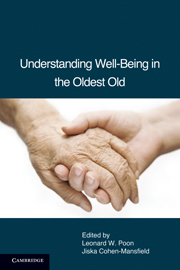Book contents
- Frontmatter
- Contents
- List of Tables
- List of Contributors
- Foreword by Carol D. Ryff
- PART I THEORY: NEW HORIZONS IN WELL-BEING RESEARCH
- 1 Toward New Directions in the Study of Well-Being among the Oldest Old
- 2 From Ageless Self to Selfless Age: Toward a Theoretical Turn in Gerontological Understanding
- 3 The Pursuit of Happiness: Alternative Conceptions of Subjective Well-Being
- 4 The Shifting Baseline Theory of Well-Being: Lessons from across the Aging Spectrum
- 5 The Model of Developmental Adaptation: Implications for Understanding Well-Being in Old-Old Age
- PART II PARADISE LOST: BETWEEN TRAUMA AND HAPPINESS
- PART III PATHWAYS AND GATEKEEPERS: MODERATING, MEDIATING, AND PROXIMAL PROCESSES
- PART IV SIGNPOSTING PARADISE: MEASUREMENT OF WELL-BEING
- Index
- References
2 - From Ageless Self to Selfless Age: Toward a Theoretical Turn in Gerontological Understanding
Published online by Cambridge University Press: 05 August 2012
- Frontmatter
- Contents
- List of Tables
- List of Contributors
- Foreword by Carol D. Ryff
- PART I THEORY: NEW HORIZONS IN WELL-BEING RESEARCH
- 1 Toward New Directions in the Study of Well-Being among the Oldest Old
- 2 From Ageless Self to Selfless Age: Toward a Theoretical Turn in Gerontological Understanding
- 3 The Pursuit of Happiness: Alternative Conceptions of Subjective Well-Being
- 4 The Shifting Baseline Theory of Well-Being: Lessons from across the Aging Spectrum
- 5 The Model of Developmental Adaptation: Implications for Understanding Well-Being in Old-Old Age
- PART II PARADISE LOST: BETWEEN TRAUMA AND HAPPINESS
- PART III PATHWAYS AND GATEKEEPERS: MODERATING, MEDIATING, AND PROXIMAL PROCESSES
- PART IV SIGNPOSTING PARADISE: MEASUREMENT OF WELL-BEING
- Index
- References
Summary
ABSTRACT
This chapter argues that the conceptual language employed to analyze the self and its well-being in later life reflects issues and concerns pertinent to styles and anxieties relevant to midlife, such as continuity, success, and meaning, rather than the underpinnings of the end of existence. Although most populations defined as elderly are amenable to being understood in terms of cumulative attainments and corresponding aspirations, the category of the very old, otherwise known as the fourth age, occupies a distinct human territory, displaying properties of time and space quite different from those marking other phases of the life course. Any attempt at comprehending the experience of the oldest old should take into account the plausibility of a reshaped identity abandoning no-longer-relevant regulative principles of subjectivity, such as emotional and cognitive lifelong constructions.
PROLOGUE: A LOST CATEGORY
The quest to understand well-being as a gerontological aspiration can be viewed as a form of resistance to the cultural imagery of old age as formulated, for example, by the founding father of gerontology, the Nobel laureate Elie Metchnikoff, in 1905 as “an infectious, chronic disease which is manifested by a degeneration or an enfeebling of the noble elements” (p. 48). Even as a metaphoric figure of speech, such phrasing, counteracting the ethos of the modern quest for the normal and the nonpathological (Foucault, 2003), would not withstand the scrutiny of current political correctness.
Information
- Type
- Chapter
- Information
- Understanding Well-Being in the Oldest Old , pp. 11 - 26Publisher: Cambridge University PressPrint publication year: 2011
References
Accessibility standard: Unknown
Why this information is here
This section outlines the accessibility features of this content - including support for screen readers, full keyboard navigation and high-contrast display options. This may not be relevant for you.Accessibility Information
- 2
- Cited by
